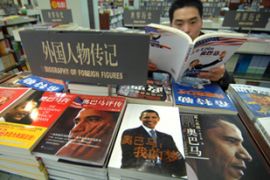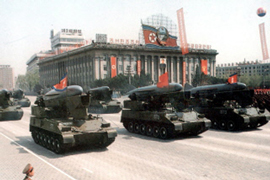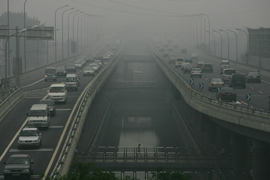Obama takes on China-US ties
What the new president means for relations with the world’s most populous country.

The short and not very exciting answer is: probably not much different from the Bush administration. Or, indeed, if circumstances had been different and US voters had opted instead for a McCain administration.
Interdependence
 |
| Obama’s in-tray is stacked with issues demanding presidential attention [AFP] |
US candidates say a lot of things on the campaign trail, and Obama has had his share of tough words for China.
But like others before him, the reality of the situation forces a distinct change of tune once they actually find themselves inside the Oval Office.
The United States and China are two interdependent powers, and there is no choice for either of these countries but to have a productive working relationship.
As such the economy – and the pressing need for both countries to work together to improve the situation – will remain the overriding issue in the relationship.
That will likely mean disappointment for those hoping that an Obama administration might mean the US putting greater pressure on China to, in turn, put pressure on the Sudanese government over the conflict in Darfur.
The same goes for expectation that an Obama administration would step up rhetoric on sensitive issues such as Tibet and Beijing’s human rights record.
Despite Obama’s choice of Susan Rice as the new US ambassador to the United Nations – she has been vocal about the need to pressure China on these issues – her influence will likely be tempered by the other China experts on board, including Jeffrey Badar, Obama’s chief advisor on Asia; and James Steinberg, the new deputy secretary of state.
Extending a hand
 |
| Obama will need China’s help in ending North Korea’s nuclear programme [AFP] |
In his inaugural address Obama told America and the world he would be open to engagement to hostile countries, “we will extend a hand if you are willing to unclench your fist.”
There is a lot of speculation already about which countries he was thinking of when he wrote that sentence.
Iran, certainly, is one possibility. While from here in Beijing, the first subject that comes to mind is North Korea.
Kim Jong-il’s reportedly failing health might very well be Obama’s first big challenge in Asia, along with how any change of leadership would change the struggling six party talks on denuclearization.
In this, the United Sates and China will need to work closely, and the success of the talks will very much depend on how closely the two countries cooperate.
Hillary Clinton, Obama’s former presidential rival and now his secretary of state, has indicated she might be open to other alternatives other than the current six-party framework.
Whatever happens, the North Korea issue could very well help set the tone of US-China relations for the next four years.
Climate threat
 |
| Obama has called for joint efforts to tackle pollution [Reuters] |
Another area for potential cooperation – or conflict – is the environment.
It’s an issue Obama has said the US is ready to take the lead on, and in a position paper to the American Chamber of Commerce in China last year he noted that China and the US, are the world’s two largest emitters of greenhouse gasses.
“As the world’s richest developed economy and largest and most dynamic developing country, our cooperation to reduce the threat of climate change can produce models, practices and technologies that will provide impetus to global efforts,” he wrote.
That emphasis on cooperation, rather than pointing fingers at China for its environmental problems, again suggests Obama will aim to adopt a conciliatory tone in his dealings with China.
But in the end, it will be the money that does the talking with economic issues dominating relations between Washington and Beijing.
With demand in the US plunging for Chinese exports, Chinese factories are producing less, which means quite a number of them have shutdown completely, which means unemployed Chinese factory workers.
Which means many, many unhappy Chinese – a big concern for the government here, worried about the possibility of social unrest.
So Beijing certainly has as large a stake as Obama does in seeing the US economy bounces back.
Both countries were aware of how much they depended on each other’s prosperity, but now — they are painfully aware of that fact.
And because the economy is President Obama’s first priority, we return full circle to his list of priorities, and see that China simply can’t and won’t be at the bottom of his list after all.